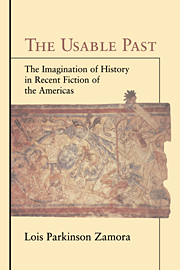Book contents
- Frontmatter
- Contents
- Preface
- Acknowledgments
- PART I ANXIETY OF ORIGINS
- 1 The Usable Past: History as Idea in the Americas
- 2 For the Record: Novels, Newspapers, Narration
- 3 Ancestral Presences: Magical Romance / Magical Realism
- PART II INTERTEXTUALITY AND TRADITION
- Comparative Conclusions: Baroque New Worlds
- Notes
- Index
3 - Ancestral Presences: Magical Romance / Magical Realism
Published online by Cambridge University Press: 01 September 2009
- Frontmatter
- Contents
- Preface
- Acknowledgments
- PART I ANXIETY OF ORIGINS
- 1 The Usable Past: History as Idea in the Americas
- 2 For the Record: Novels, Newspapers, Narration
- 3 Ancestral Presences: Magical Romance / Magical Realism
- PART II INTERTEXTUALITY AND TRADITION
- Comparative Conclusions: Baroque New Worlds
- Notes
- Index
Summary
Ghosts can be very fierce and instructive.
Flannery O'Connor, Mystery and MannersI HAVE CONSIDERED the different historiographic heritages of U.S. and Latin American fiction and consequent generic arguments about the nature of realism: how (and whether) historical experience can be remembered, reported, and (re)created in words. I now want to turn to literary works that enlarge these definitions of history by resuscitating figures from the past that the realist novel ordinarily excludes. These figures are ghosts, and I will be conjuring a number of them in order to consider how they are embodied (or not) in particular works of prose fiction; whether they are visible (and if so, to whom and why); and whether they speak, eat, or dream. An investigation of the nature of literary ghosts will tell us a great deal about their authors' philosophy and poetics of history – how they understand and embody the past in literary structures. The frequent appearance of ghosts in magical realism and romance suggests current redefinitions of the self and runs parallel to redefinitions of positivism such as Borges' “modest history,” to which I referred earlier. Borges will again play an important role in my comparative discussion, as will Octavio Paz. Borges and Paz are consistently engaged in comparing literatures and cultures in the Americas – our different versions of Western civilization, as Paz puts it in his essay “Mexico and the United States.”
- Type
- Chapter
- Information
- The Usable PastThe Imagination of History in Recent Fiction of the Americas, pp. 76 - 126Publisher: Cambridge University PressPrint publication year: 1997

